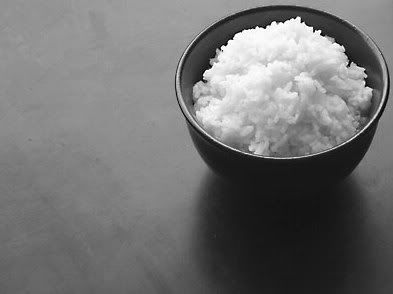
Cheese adulterated with pieces of fruit. Real ale made to taste like chocolate. Chocolate laced with oranges. Rooibos flavoured with cheese, real ale, chocolate, and oranges. These are crimes against the taste buds, usually covering up a mediocre base product.
So, then, shupu with rice fragrance? Glutinous rice fragrance, we would imagine, from "nuomixiang".
 This is from the Chunming [spring-bright] tea factory, set up in the 90s in Kunming West Hills, and hails from Yunnan Sourcing. It's made from Simao-area (Fengqing) leaves, which Scott notes are fermented for 45 days and then left to dry naturally. At the point of compression into bingcha, they are steamed in cooked rice. It's very inexpensive - $12/bing.
This is from the Chunming [spring-bright] tea factory, set up in the 90s in Kunming West Hills, and hails from Yunnan Sourcing. It's made from Simao-area (Fengqing) leaves, which Scott notes are fermented for 45 days and then left to dry naturally. At the point of compression into bingcha, they are steamed in cooked rice. It's very inexpensive - $12/bing.Many thanks to CB for this sample.
Gaiwan; Caledonian Springs mineral @ 100C; 2 scoops; 2 rinses.
12s, 10s, 12s, 15s, 25s, 40s:
Rice red-orange soup. It looks... like shupu. I'm not against shupu a priori, I should add, given the current anti-shupu climate, so my mind is open with regard to this tea.
The initial aroma is, we agree, "fishy rice". The scent is long-lasting, and rather pleasant.
The foretaste is smooth and low. A tangy mid-taste is a precursor to a late-arriving bitterness, that takes a surprising amount of time to arrive at the back of the tongue, but really digs in once it's there. It is definitely not unpleasant. The rice/fish effect sits in the nose.
After reducing the amount of leaf in the gaiwan, the "fishiness" is greatly reduced, and the bitter final note is similarly weakened.
As with many of these novelties (such as languiren, being dipped in ginseng and aniseed), the additive only lasts for the first few infusions - three, in this case. After that, it's the bold flavour of a decent shupu. It's not violent, but it is rather rich and seemly. It is stable all the way through the sixth infusion, and can clearly keep going long after we have tired.
Leaves:
No prizes for guessing: dark, and gnarled.
Overall:
A decent shupu which has been blended with the rice flavour to a surprisingly good effect. The two sets of aroma and flavours are highly complementary; so much so, in fact, that we are decided to add a bing of this to our supply. The shupu itself is stable, gentle, and well-fermented - definitely going against expectation. It pays to be cautious with the quantity of leaf when brewing this tea.
This is much more than just a novelty.


No comments:
Post a Comment